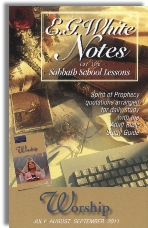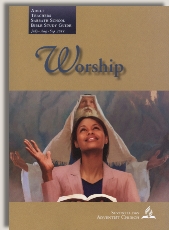|
||||||||||||||
Commentary on "Worship and the Exodus: Understanding Who God Is"
Day 4: Tuesday, July 5, 2011 - No Other Gods
Overview
Today’s lesson looks at Exodus 20:1-6 where God begins giving the words of the covenant to Israel. The lesson observes that Mt. Sinai is shrouded in clouds and troubled by earthquakes, lightening, and the sound of trumpets.
God reminds the children of Israel at the beginning of the Ten Commandments that He is the One who led them out of Israel. Only God could have done this; pagan gods are selfish, demanding, and often immoral. Israel needed to know the Lord their God as the only God.
The lessons asks how the second commandment (v. 4-5) can apply to us, and it ends with and Ellen White quote from Patriarchs and Prophets that whatever we cherish tends to “lesson our love for God” and we make gods of those things.
Observations
The lesson misses the point that when God spoke (for in chapter 20, He spoke the commandments to Israel) the words of the covenant to Israel, He was not primarily giving them a rule for living but revealing Himself to them and showing them who they were in relationship to Him.
The context of Exodus 20 is that Israel is God’s special people already. He has already delivered them from slavery; they are already redeemed. The law is not bringing about a relationship that did not previously exist. Rather, it is a gift that God is giving His redeemed people
God did not give the law to Israel to save them or to keep them saved; He gave it to the people He had already redeemed. His first words of the Ten Commandments declare that they are saved by His sovereign power:
And God spoke all these words, saying, “I am the Lord your God, who brought you out of the land of Egypt, out of the house of slavery” (Ex. 20:1-2).
This covenant God spoke to Israel was unique to Israel. No other god ever made a covenant with people, and God never made a covenant with any other people. God made eternal, unconditional covenants with Abraham, with David, and He made the unconditional new covenant with Israel and ushered the gentiles into that as well, but never before or since did God make a bilateral, conditional covenant between Himself and any nation or people.
This covenant was a gift to Israel from God who had formed and chosen and redeemed them beforehand.
Moreover, the law was given as a means of blessing, never of salvation. The Ten Commandments formed the core of God’s covenant with Israel, and these “words of the covenant” (Ex. 34:28) were set apart three ways:
- They were spoken by the mouth of God. Israel heard God speak them, and they were terrified, begging Moses not to have God speak to them but for him to speak to them instead (Ex. 20:19).
- They were subsequently written by the finger of God on stone.
- They were later placed in the presence of God in the Holy of Holies.
Finally, the law God gave to Israel was an expression (not a transcript) of the character of God. A transcript is an exact replica or copy which contains all the data of the original. God’s character cannot be summarized in a written or even a spoken law. God’s gift of the law in Exodus 20 revealed that God is a speaking God. He spoke this covenant to Israel, and He spoke the new covenant to the world in the person of His Son, the Lord Jesus (Jn. 1:1, 14).
Moreover, God’s giving the law revealed that He is a personal God. He used His personal name, Yaweh, when He revealed Himself to Moses and to Israel. Further, the law reveals that He redeems, that He delivers His people in the flesh in acts within human history. He is unique, unrivaled, holy, jealous, zealous for the loyalty and faithfulness of His people. The law also revealed to Israel that He is a God of grace.
Concurrently, He will not be trivialized. He is powerful, a creating God, a promise-keeping God.
Finally, He is not as we imagine Him but as He reveals Himself to be.
One of the biggest underlying problems in this lesson is the unspoken assumption that we can refine our worship of God by analyzing ourselves. The Ellen White quote that whatever we cherish tends to lesson our love for God or interferes with our service that is due Him misses the point.
Worship is not a cognitive decision. Moreover, worship is not something we do to show honor to God at appointed times, as the Teacher’s Comments suggest on p. 23. Family or personal devotions, weekly church services...these things do not define or even equal worship. Worship is not reading the Bible and offering prayers.
Worship is a person’s response to the Person of the Lord God. Especially, worship is not what we decide to do for God. True worship is defined by God, not by humans. Only when we approach Him and worship Him as He reveals we must are we actually worshiping Him.
When Israel trembled with fear at Mt. Sinai, that reaction was part of a true worship response. They reacted appropriately to the presence of the Holy God. As sinful humans they were not to approach the presence of God on their own terms. They had to have a mediator…and Moses was that mediator. They trembled with fear at God’s voice, and that response was appropriate.
As God continued revealing the law to Moses, He provided for sacrifices and priests to make it possible for sinful people to approach a Holy God. But as Israel was when God spoke the commandments, they were not able to approach God, and their fear was an appropriate response. It was a form of worship…an acknowledgement of Who God actually is, and responding to Him truthfully as the sinners that they were.
It is pointless to ruminate about whether or not we have personal idols that keep us from properly worshiping God is we have not dealt with God according to His terms. When God sent His Son, He provided the only way we may approach God. The Lord Jesus IS the sacrifice for sin, and unless we repent and receive His blood as payment for our hopeless sinfulness, we cannot approach God.
God is not described and embodied in the commandments, nor do we experience God in or by means of observing the commandments. The commandments were only a shadow; God is realized and experienced in the Lord Jesus.
Jesus said to him, “I am the way, and the truth, and the life. No one comes to the Father except through me.” (John 14:6 ESV)
Unless we receive the Lord Jesus and bow to Him as our Savior and Lord, we cannot approach the Father. No amount of “commandment keeping” qualifies us to approach or worship God. He is the only way we can know God, and only when we are made alive in Him can worship God.
Summary
- God revealed His grace, ownership, and sovereign relationship to Israel when He gave the commandments.
- God revealed Himself as a speaking, personal God.
- God is NOT as we imagine Him to be but as He reveals Himself to be.
- We cannot honor or worship or even approach God unless we do so on His terms.
- Receiving the Lord Jesus sacrifice for our sin is the only way God grants us to approach Him.
- Unless we receive Jesus, no amount of “commandment keeping” or good works counts for anything. We must be born again.
I am indebted to Gary Inrig’s sermon on Exodus 20 given June 19, 2011, for the insights in this lesson. You can find it here: Gary Inrig: "Core Values"
Copyright 2011 BibleStudiesForAdventists.com. All rights reserved. Revised July 4, 2011. This website is published by Life Assurance Ministries, Glendale, Arizona, USA, the publisher of Proclamation! Magazine. Contact email: BibleStudiesForAdventists@gmail.com.
The Sabbath School Bible Study Guide and the corresponding E.G. White Notes are published by Pacific Press Publishing Association, which is owned and operated by the Seventh-day Adventist church. The current quarter's editions are pictured above.
Official Adventist Resources
Standard Edition Study Guide Week 2
Teacher's Edition Study Guide Week 2
Easy Reading Edition Study Guide Wk 2
Search the Complete Published Ellen G. White Writings
Please Support This Project


